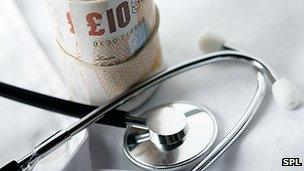Cancer 'drives families into debt', says charity report
- Published

Unexpected costs can include travel to hospitals, accommodation, food and clothing, the report says
Two-thirds of parents of children with cancer surveyed by a cancer charity say they have been forced to borrow money to make ends meet.
Of the 245 families interviewed, 76% said that their child's illness had had a major impact on finances with two in three parents experiencing a loss of earnings.
The survey was carried out by children's cancer charity CLIC Sargent.
It wants the government to ensure families get more financial support.
For their report, entitled Counting the Costs of Cancer, the charity also sought the views of 90 young people with cancer through an online survey, focus groups and telephone interviews.
Parents and young people told the charity that they spent on average £367 and £277 respectively on cancer-related expenses every month, and with treatment lasting up to three years, the bills soon mounted up.
This added up to a spending of £4,400 for parents and £3,325 for young people each year, the report said.
These costs included travel and car parking to get to hospitals and treatment centres, additional clothing for the child as a result of weight loss, food to supplement that available in hospital, and other costs such as telephone calls and accommodation.
'Under pressure'
The report found that of those parents who acquired debt, 41% borrowed £1,000 or more and 27% borrowed more than £2,000.
Six per cent of parents surveyed said they had turned to high interest, short-term loans to cope with the additional costs.
Family finances were also put under pressure by time needed to care for the child with cancer, with three in five respondents saying they had to reduce the number of hours they worked.
Some parents were forced to give up work completely to care for their child.
CLIC Sargent said it was concerned that government reforms would restrict families' options to financial support through the benefits system.
Lorraine Clifton, chief executive of CLIC Sargent said the cost of caring for children with cancer was often unexpected.
"Everyone is suffering in this economic climate but parents of children with cancer are amongst the hardest hit. The extra costs can be significant. It's shocking to hear that some families felt driven to debt in order to get through financially.
"We're dependent on the generous support of the public and other donors to fund our vital work to support young cancer patients, but the money we raise can only be part of the solution.
"We want to work with the government and other organisations to find better ways of ensuring young people and children with cancer, and their families, have the financial support they need."
The report also found a significant impact on the lives of young people who had cancer.
Five in six surveyed said that their quality of life had been affected and two in three young people felt they were less able to study well.
A spokesman from the Department for Work and Pensions said that people with terminal cancer are fast-tracked.
"In these cases we pay the highest rate care component of Disability Living Allowance immediately and unconditionally regardless of daily care needs.
"Under the new Personal Independence Payments (PIPs) we are introducing a new objective assessment and regular reviews to make sure people get the right levels of support."
- Published1 December 2011